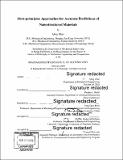First-principles approaches for accurate predictions of nanostructured materials
Author(s)
Zhao, Qing,Ph. D.Massachusetts Institute of Technology.
Download1102316327-MIT.pdf (22.98Mb)
Other Contributors
Massachusetts Institute of Technology. Department of Mechanical Engineering.
Advisor
Heather J. Kulik.
Terms of use
Metadata
Show full item recordAbstract
Nanostructured materials have attracted increasing interest in recent years due to their unusual mechanical, electrical, electronic and optical properties. First-principles electronic structure calculations (e.g., with density functional theory or DFT) provide unique insights into the structure-property relationships of nanostructured materials that can enable further design and engineering. The favorable balance between efficiency and accuracy of DFT has led to its wide application in chemistry, solid-state physics and biology. However, DFT still has limitations and suffers from large pervasive errors in its predicted properties. For small systems, more accurate methods are available but challenges remain for studying nm-scale materials. In the solid-state, unique challenges arise from both the strong sensitivity of correlated transition metal oxides on approximations in DFT and the periodic boundary condition. Therefore, a greater understanding of approximations inherent in DFT is needed for nanostructured materials. In this thesis, we study nanostructured semiconducting materials, where conventional DFT can be expected to perform well. We develop methods for sampling amorphous materials, rationalizing periodic table dependence in material stability for materials discovery of ordered materials, and bring a surface reactivity perspective to understanding growth processes during materials synthesis. Within the challenging cases of transition metal oxides, we explore how common approximations (e.g., DFT+U and hybrids) affect key nanoscale properties, such as the nature of density localization, and as a result, key observables such as surface stability and surface reactivity. Observation of divergent behavior between these two methods highlights the limited interchangeability of DFT+U and hybrids in the solid-state community. Finally, leveraging the understanding developed in the first two parts of the thesis, we employ a multiscale approach to systematically tailor DFT functional choice for challenging condensed phase systems using accurate reference data from higher level methods. The combination of large-scale electronic structure modeling with state-of-the-art methodology will provide important, predictive insight into tailoring the nanoscale properties of useful materials, and further development in approximate DFT.
Description
Thesis: Ph. D. in Mechanical Engineering and Computation, Massachusetts Institute of Technology, Department of Mechanical Engineering, 2019 Cataloged from PDF version of thesis. "February 2019." Includes bibliographical references (pages 154-180).
Date issued
2019Department
Massachusetts Institute of Technology. Department of Mechanical EngineeringPublisher
Massachusetts Institute of Technology
Keywords
Mechanical Engineering.